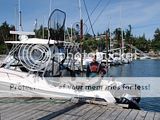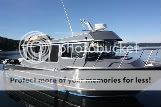Nah, Dave... Your new friend is wrong!
If you are a BC resident, and your "personal" rig is "legal" in BC... It is legal in the U.S. If my rig is legal in Washington... It is legal in any state and BC. You still must abid by their laws, but the actual rig is legal. Note... you still need proper permits...eg "oversize load", "over weight", etc.
Like I have mentioned before, don't argue with anyone just ask if it is easier to follow them to the station or have a supervisor come to you? Both the U.S. and Canada signed and agreed to abid by the Vienna Convention on road Traffic.
I have the actual agreement at home, but what 'Wikipedia' is stating is correct. You should be able to find it but here is a link to get you started. That is like saying "you" also have to have a "Washington" drivers license... Nope!
http://en.wikipedia.org/wiki/Vienna_Convention_on_Road_Traffic
"One of the main benefits of the convention for motorists is the obligation on signatory countries to recognise the legality of vehicles from other signatory countries. However, the following requirements must be met when driving outside the country of registration:
Cars must display their registration number at the front and rear, even if legislation in the jurisdiction of registration does not require a front vehicle registration plate on cars. Motorcycles need display their registration number only at the rear. Registration numbers must be displayed in Latin characters and Arabic numerals. In addition to this, the registration number may optionally be displayed in a different alphabet.
A distinguishing sign of the country of registration must be displayed on the rear of the vehicle. The physical requirements for this sign are defined in Annex 3 of the convention, which states that it must comprise black writing on a white oval background and that it must not form part of the vehicle's registration number. In practice, the requirement to display the white oval is mutually waived between some countries, for example between many European countries (where the white oval may be substituted by a blue strip on the vehicle registration plate) and between Canada, the United States and Mexico (where the state or province of registration is usually embossed or surface-printed on the vehicle registration plate).
The vehicle must meet all technical requirements to be legal for road use in the country of registration. Any conflicting technical requirements (e.g. right-hand-drive or left-hand-drive) in the signatory country where the vehicle is being driven do not apply.
The driver must carry the vehicle's registration certificate, and if the vehicle is not registered in the name of an occupant of the vehicle (for example a hire car), proof of the driver's right to be in possession of the vehicle."
BTW... he won't be snickering very much about being written up and my boat and trailer being loaded onto a flatdeck and sent back to the border(which he said said costs the owner a pile of money), when I send "that" bill to Canada and BC, along with my demand for damages with his name on it! You might want to stop in and let him know he needs to do a little homework and check on that!




